Liechtenstein's population is distributed among the eleven municipalities covering a total of 160 km2. The capital of Liechtenstein is Vaduz, the two neighbouring countries are Switzerland and Austria. According to the Office for Statistics, the population of Liechtenstein was 40'015 at the end of December 2023. A third of which are foreign citizens, mainly Swiss, Austrians and Germans. Density of population is at roughly 220 inhabitants per square kilometer; this is to say that the settlement area is mainly in the Rhine Valley, the alpine area covers around half of the national territory.
Citizens from abroad contribute to a considerable rejuvenation of Liechtenstein's population: in comparison with other European countries the age groups at working age (20 years to 64 years) are particularly well represented in Liechtenstein. The proportions of children and older people however are below average. The reason for this observation can be found in the high proportion of foreign citizens who have immigrated to Liechtenstein at working age, i.e. at a relatively young age, and who often return home upon reaching retirement age.
Languages
Official language is German, this is to say that the spoken language is an Alemannic dialect. Standard German is then the second form of the mother tongue/first foreign language and is usually being acquired together with the acquisition of the written language or rather with the start of schooling. The language used at school is Standard German. This parallel use of dialect and Standard German is typical for everyday life (so-called “diglossia”), this situation makes linguistic integration for many immigrants a difficult process, especially for the children.
Religion
The principal denomination in Liechtenstein is Roman-Catholic. In 1930 the proportion of Catholics was 97.3 percent. Throughout the 20th century a somewhat more diverse pluralist composition of the population developed mainly due to immigration resulting from economic development on the one hand, and marriages on the other hand.
While immigrants from the southern countries of origin Italy, Spain and Portugal were mainly Catholics, immigration from the German speaking countries Switzerland and Germany brought both Catholics and Protestants to Liechtenstein. Austrians however were mainly Catholics. Immigration from eastern and southeastern European countries brought Orthodox Christians to Liechtenstein, immigration processes thus showing different, but almost exclusively Christian denominations in Liechtenstein until the 1970s.
The constitution confirms freedom of religion and conscience (art. 37), but it declares at the same time the Roman Catholic Church to be the State Church and as such to enjoy the full protection of the State together with public and legal recognition. This constitutional feature and unique position is a central hallmark of the Liechtenstein state church system, equal treatment of other denominations being alien to the Liechtenstein constitution. This shows that other denominations are merely given private-law status by the constitution.
Religion and education
Developing educational structures was substantially achieved by members of religious orders especially by providing teachers and establishing schools. Along with religious changes or rather pluralism Religious Education has changed, too.
According to the constitution education must be organised in such a way that children and adolescents may acquire religious and moral education. The School Law of 1971 underlines the importance of the education of the pupils and adolescents according to Christian principles. The education system is under state supervision regardless of the sacrosanct ecclesiastical doctrine.
At Liechtenstein's state schools Religious Education (RE) is offered by the following denominations:
- Roman Catholic RE
- Protestant RE
- Islamic RE
- Religion and Culture (Religion und Kultur; non-denominational subject treating all major world religions)
Denominational RE (Catholic and Protestant) is embedded and detailed in the School Law. As the Islamic denomination so far has not been recognised by the state in Liechtenstein Islamic RE is currently organised as a school project at primary school level.
As for Catholic or Protestant RE pupils may choose to opt out. Freedom of religion is part of the constitution. There is no substitution for pupils who don't participate in Religious Education. At lower and at upper secondary school denominational RE is a compulsory elective subject, so the students or rather their parents make a choice between the non-denominational subject “Religion and Culture” and denominational RE. Opting out is not possible at this school level. From school year 2013/2014 denominational RE has been restricted to lower secondary school.
Responsibility of content: The particular denominations are responsible for the content of denominational RE whereas the subject “Religion and Culture” is in the responsibility of the state.
Teachers of denominational RE are recommended for employment by the respective denomination to the municipality (primary school) or rather to the state (lower secondary school). For the teaching of Catholic RE teachers need the mandate of the archdiocese besides an adequate level of education . Teachers giving lessons in the subject “Religion and Culture” need level-specific training as a teacher either for Catholic or Protestant RE, or an education in theology complemented by a teaching diploma.
Teachers of RE at primary school are appointed by the municipalities and are on their payroll. Expenses for Protestant RE at primary school are borne by the state, the same applies to denominational and non-denominational RE at lower and at upper secondary school.
References:

